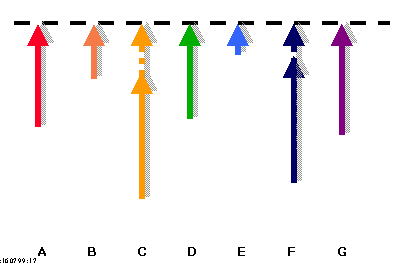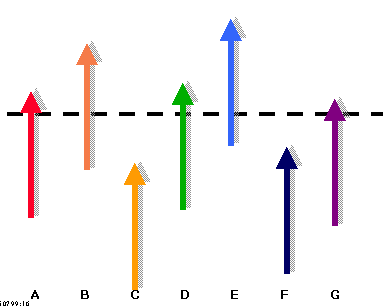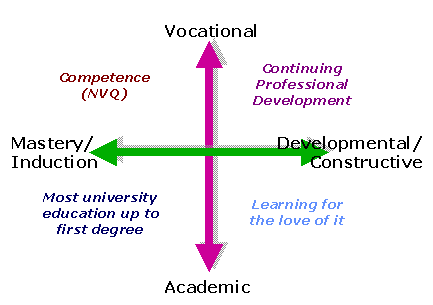“Curriculum” is a term used in a number of related ways.
- First, it can refer to the overall content of what is to be taught, as in the "National Curriculum" in the UK, which specifies the content of by far the largest part of compulsory schooling.
- Second, it can refer to the underlying principles of the approach to teaching and learning, as in a "developmental curriculum" or a "competency-based" curriculum.
- Third, it can embrace both elements, and refer to the overall "what", "how" and "why" of teaching. Note that on the whole it is a "teaching side" — rather than "learning side" — term.
Forms of Curriculum
For our present, practical purposes, we can let the form (if not the content) of the curriculum be dictated by the question, "What are you teaching this material for?" Students have a variation on this: "Why do we have to learn this?"
We can set up a model which works along two dimensions: (click on the labels if you want to go straight to the associated notes)
Click here for some examples: (which you may not agree with.) If not, why not?
Academic
(Expressive)
The material is deemed to be important in its own right, either because the students are interested in it, or they ought to be interested in it. Either there is no great concern that they should use it, or the variety of ways in which it might be used is so great that we do not concern ourselves with it.
So this applies to important elements of our cultural heritage, such as history or literature. The reply to the alienated student's question, "Why do we have to learn this stuff?" is basically, "Because it's good for you". If that assumption is not shared, the teacher of an academic subject is in trouble — and often takes refuge in a vocational/professional orientation (below).
We may be strictly practical on this site, but this can't pass without a note about the political and cultural assumptions which are inevitably built in any academic curriculum — less so in the case of, say, an evening class on the history of art for which members have signed up purely out of their own interest, but more so in any situation where the learners are being taught a package selected by those in authority. The choice of the canon of good literature, or what is left out of a music appreciation course, or Darwinism vs. Creationism: all contain inescapable value judgements.
It is often when we disagree with those judgements that we declare that "education" has become "indoctrination", particularly when the content of the material taught is regarded as not open to debate
While academic study is often more highly valued than vocational and professional study, in practice it is often more concerned with the lower reaches of Bloom's taxonomy in the cognitive domain (which may of course be a critical comment on Bloom's construction of "application" as the third level). The distinctive contribution of the academic curriculum, however, is to the more complex affective domain.
Vocational/
professional
(Instrumental)
"Why do we have to learn this stuff?" "Because you can use it to..."
The emphasis is on using the material in order to do something else. Mathematics is often justified in this way, but so are law, perspective in drawing and cookery skills. The content is not necessarily different from the academic curriculum. Detailed analysis of Shakespeare's plays may be justifiable to hone the skills of a political speech-writer. Physics is necessary to know how to service a photo-copier.
But — the selection of the material may be different, (we are not so interested in the character of Mark Antony, as in how he gets his effect in the "Friends, Romans, countrymen" speech), and what you expect the students to take away with them is different.
That means that it may not matter whether you can remember (or reproduce in assessment) how to derive the equation for working out a standard deviation, but it may matter whether you know when to use it. Does anyone care whether you can name the main food groups, as long as you eat a balanced diet?
Education becomes training (in my opinion) when the balance shifts so far in the direction of utility, that you do not concern yourself with the background material, and in particular when continuing debates about the validity of that material are ignored. This may be legitimate: surveyors can safely be trained without reference to the curvature of the earth. It may not: counsellors are often trained without reference to the extremely dubious content of some of their psychology.
This kind of curriculum assumes that what needs to be learned exists "out there" — that the task of education (or training) is to induct you into an established body of knowledge.
It has been argued that this is true of most academic knowledge up to first-degree level, and certainly it is necessary to provide a basic foundation. Not everyone will need to build beyond that foundation. Lawyers, for example, need to know the law, which already exists: only a few judges (and lawyers who become politicians) will go on to make it. The laws of physics, too, are well-established and tested: only the occasional jumped-up patent-office clerk modifies them.
Competence-based curricula are almost necessarily based on this model. It is assumed that the curriculum designer knows what competence consists of, in a particular vocational area, and what performance criteria constitute evidence of it.
However, subjects differ in how soon in your educational career you stop being simply inducted and start contributing to the endless debate of your subject. In the humanities that stage may come earlier than the sciences. And sometimes there is a continual oscillation: the musician first masters a piece and then adds her interpretation — and then masters another one ...

The other kind of curriculum — often concerned with quite advanced skills (rather than simple knowledge) — is a developmental one.
It is centred on the development of the student — "maximising potential" is the jargon phrase — and tries to take them forwards from wherever they are to a more sophisticated understanding or skill in a particular area: the measure is "improvement" rather than the achievement of a particular level.

Thus there are continuing debates about the justification of any curriculum. You may not need to engage with all of them, but to build yours you do need to be clear about where you stand with your material, not least because it affects how you assess it.
Implications
The above model is just one of many ways of conceptualising different models of the curriculum. What all of them do is to direct your attention to the fact that the assumptions you make about what you are up to will affect the way you set about teaching.
- The Vocational/Mastery oriented teacher (or trainer) designs an efficient and probably standardised curriculum which takes learners step-by-step to a pre-determined level of competence. It may be open-ended: as soon as you have demonstrated your competence you can stop learning (like the driving test), but until then you keep having the lessons. The threshold of competence is determined by clear right and wrong answers, and it is easy to formulate objectives.
- The Vocational/Developmental teacher is probably working with more experienced practitioners, and uses open-ended exercises and promotes peer interaction to help them to cultivate their expertise. There is more uncertainty, and feedback is more discursive. Assessment is much more difficult, and the teacher may struggle to formulate objectives which do not contain words like "understand" and "appreciate". (Although that is not as much of a sin as some hard-liners maintain)
- The Academic/Induction teacher is probably the teacher we all knew in school. She has a clear body of knowledge to pass on, and your success is assessed by the extent to which your answers conform with hers. What counts as acceptable performance and knowledge, however, can always be debated: in practice the debate is often curtailed by the demands of assessment bodies, which set the "syllabus".
- The Academic/Constructive teacher may well be yourself—the same person as the learner— when you set out to learn about something simply because you are interested. What counts as progress may be highly individualised: the "syllabus" may be subordinated to your interests, and the most important assessment is self-assessment.
These are all "ideal types" — in the real world most teaching and learning contains mixtures. All have their place, despite the vociferous arguments of proponents of one model or another. Nevertheless, it helps to be clear about what you are trying to do.
Atherton J S (2013) Learning and Teaching; [On-line: UK] retrieved from
Original
material by James Atherton: last up-dated overall 10 February 2013 
This work is licensed under a Creative Commons Attribution-Noncommercial-No Derivative Works 3.0 Unported License.
Search Learningandteaching.info and associated sites:
![]() Save this on Delicious Tweet
Click
here to send to a friend
Save this on Delicious Tweet
Click
here to send to a friend

This site is independent and self-funded, although the contribution of the Higher Education Academy to its development via the award of a National Teaching Fellowship, in 2004 has been greatly appreciated. The site does not accept advertising or sponsorship (apart from what I am lumbered with on the reports from the site Search facility above), and invitations/proposals/demands will be ignored, as will SEO spam. I am of course not responsible for the content of any external links; any endorsement is on the basis only of my quixotic judgement. Suggestions for new pages and corrections of errors or reasonable disagreements are of course always welcome. I am not on FaceBook or LinkedIn.

